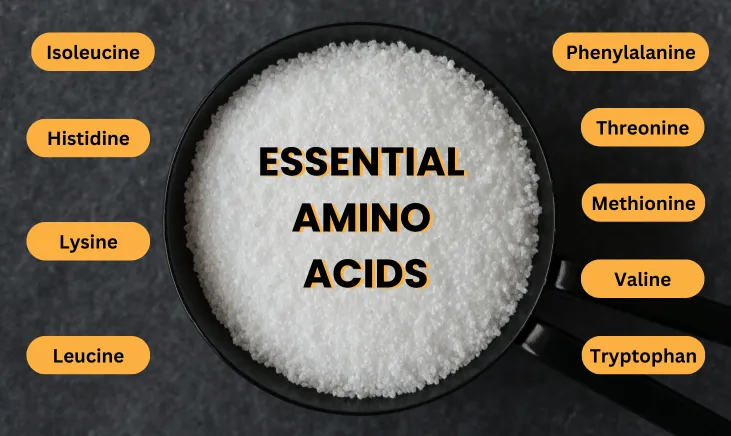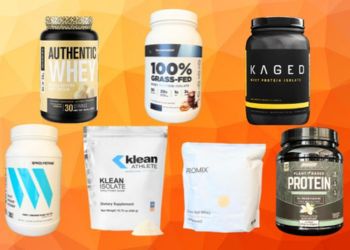Understanding the significance of amino acids may be one of the missing pieces to take your fitness to the next level. Whether you are a fitness enthusiast or a professional athlete, paying more attention to the different amino acids can help you decide whether you may or may not benefit from amino acid supplements and if so, when to take them.
Table of Contents
What Are the Nine Essential Amino Acids?
Amino acids are molecules that combine to form protein structures, which make up muscles, connective tissue, organs, and other body tissues. There are 20 amino acids that the human body needs. Of those, 11 are considered non-essential amino acids, meaning that the body can produce them naturally from essential amino acids. Essential amino acids (EAAs) are the nine amino acids that the body cannot create on its own, and thus, they need to be consumed in sufficient amounts through a well-balanced diet. Most whole foods contain all 20 amino acids but in varying amounts. These amino acids are:
- Histidine
- Isoleucine
- Leucine
- Lysine
- Methionine
- Phenylalanine
- Threonine
- Tryptophan
- Valine
Both essential and nonessential amino acids play critical roles in various physiological processes, including muscle protein synthesis, immune function, and energy production.
Muscle Protein Synthesis
Muscle protein synthesis (MPS) is the physiological process in which the body builds and repairs muscle tissue. A significant component of muscle tissue is proteins, which are made up of amino acids. There are a number of factors that impact muscle protein synthesis, such as exercise, nutrition, sleep, and stress. One of the key nutritional contributors to MPS is the quality and quantity of amino acid consumption.
In our diet, we should consume an optimal amount of total protein which will ensure a beneficial amount of EAAs. Some amino acids stimulate muscle protein synthesis more than others, notably leucine. That being said, all amino acids are important for the process of muscle building and repair.
How BCAAs Help You Reach Your Fitness Goals
Of the nine EAAs, three are considered branched-chain amino acids (BCAAs), named after their branched structure. The BCAAs are leucine, valine, and isoleucine. In other words, all BCAAs are a type of EAA. As mentioned earlier, leucine is one amino acid that may stimulate muscle protein synthesis more than others.
Research suggests that BCAAs can be particularly beneficial in preserving lean muscle mass, especially during calorie-deficient periods or intense training. BCAAs also play a role in glycogen synthesis. Glycogen is a type of carbohydrate that is stored in muscles and used for energy, especially in shorter bursts of intense exercise.

What Are the Benefits of Essential Amino Acid Supplements?
We know that we need EAAs, but can we get enough through protein-rich foods alone, or should we take a supplement? The answer to that depends on personal goals, needs, preferences, and lifestyle.
EAAs can be especially helpful for individuals who struggle to consume enough total protein and a variety of protein foods. Those consuming adequate protein in their diet may not see any benefit from an EAA supplement.
Protein powder supplements already contain a range of amino acids, and the composition of amino acids will differ slightly depending on the supplement brand. Some protein powders have additional EAAs added. EAA supplements typically include all nine EAAs, meaning they also include BCAAs.
Amino acid supplements supplements are designed to help your body obtain some of the necessary materials for muscle protein synthesis and repair. This becomes particularly relevant for individuals with dietary restrictions or those looking to enhance their amino acid intake beyond what is obtained through food sources alone. Two common types of amino acid supplements include EAAs and BCAAs.
The evidence isn’t conclusive, but EAA supplements have been associated with an increase in muscle protein synthesis and muscle strength. This is more likely to be true for those who are engaging in resistance training and are consuming less dietary protein. EAA supplements have been shown to have potential benefit for older adults especially, since MPS decreases with age. This can lead to sarcopenia, the breakdown of muscle over time with aging and inadequate muscle stimulation.
Benefits of BCAA Supplements
BCAA supplements are similar to EAA supplements, but they only contain the three BCAAs. Some protein powder sources which naturally contain BCAAs are pea, whey, rice, milk, and soy protein. Some protein powders have additional BCAAs added.
The research on the benefits of BCAA supplements for exercise isn’t quite conclusive, but there is some evidence of potential benefits. A recent systematic review suggested that BCAA supplementation may have limited effects on exercise performance but may be beneficial in reducing muscle soreness. Ideally, reduced muscle soreness means quicker recovery, allowing a quicker return to training, and therefore more overall training volume and/or intensity. This aspect of BCAA supplementation becomes especially relevant for individuals engaged in high-intensity training or those prone to delayed onset muscle soreness (DOMS).
Leucine, one of the three BCAAs, plays a key role in muscle protein synthesis, by activating the mTOR pathway, which is a signaling pathway that regulates muscle protein synthesis. By directly influencing this pathway, BCAAs contribute to the efficient building and repair of muscle tissue. However, if you consume enough leucine through diet, supplementation may not provide additional benefits.

Consuming BCAAs During Strenuous Activity or Exercise
The timing of BCAA consumption isn’t a make it or break it, but it may be something athletes want to pay more attention to. Consuming BCAAs before or during your workout provides your muscles with a readily available source of amino acids, potentially preventing some muscle breakdown.
During intense exercise, BCAAs may help reduce exercise-induced fatigue. During exercise, the muscles use BCAAs, which decreases their concentration in the blood. When this occurs, the amino acid tryptophan increases in the brain. Tryptophan is a precursor to serotonin, a neurotransmitter that is believed to increase feelings of fatigue. Some research has found that supplementation of BCAAs may help reduce the uptake of tryptophan into the brain, therefore decreasing fatigue related to serotonin production.
Consumption of free amino acids, such as in EAA and BCAA supplements, has been shown to increase total circulating amino acids faster than intact dietary protein, according to one randomized control trial. However, there was no difference in muscle strength and no statistically significant increase in muscle growth.
EAAs Post-Workout
As mentioned earlier, one of the stimulators of MPS is strength training. Engaging in strength training increases the likelihood of benefitting from EAAs.
EAAs also play a crucial role in the recovery process. Beyond promoting MPS, EAAs contribute to glycogen replenishment, reducing muscle soreness and minimizing the risk of overtraining. This doesn’t necessarily mean you need to consume EAAs as a supplement, as you can get enough through diet. Individuals with more personalized fitness goals may want to experiment with EAA supplements to see if they benefit.
The evidence isn’t conclusive, but some studies suggest that consuming amino acid or protein supplements after exercise can help reduce inflammation and oxidative stress induced by exercise. A meta-analysis of eight studies found that BCAA supplementation decreased DOMS after intense exercise training.
In terms of timing, the evidence isn’t conclusive whether there is an optimal period of time after exercise to ingest EAAs. However, it’s usually recommended to consume protein within a few hours after exercise and to consume an adequate amount of total protein in the day.

During Endurance Workouts or Long Training Sessions
Endurance workouts demand sustained energy and muscle support. As mentioned earlier, BCAA supplements may help reduce muscle soreness. Although endurance and cardio exercise may not be focused on building muscle, it still requires high engagement of muscle fibers. Regardless of whether amino acids come from protein or supplements, adequate intake helps optimize post-workout recovery, decrease risk of muscle wasting, and help improve exercise performance moving forward.
Research suggests that BCAAs have a glycogen sparing effect, meaning that glycogen can be used to support energy needs for longer training time. One review explains that BCAAs stimulate uptake of glucose into the liver and skeletal muscle, which can then be used for energy.
It’s also important to consider other important nutritional support during longer workouts, including carbohydrates, electrolytes, and water.
Plant-Based EAAs
EAAs come in both animal or plant-derived forms. For those following vegan or plant-based diets, EAAs can help bridge the potential gap in meeting needs for a complete profile of amino acids in the diet. That being said, a vegan diet can provide adequate EAAs through protein-rich foods consumed in the right quantities.

Frequently Asked Questions
Should you take amino acids after a workout?
In general, it depends on your goals, needs, and other lifestyle factors, but for muscle building and recovery, it’s recommended to consume protein within a few hours after a workout. This may or may not include an amino acid supplement, but reaching your protein goal by the end of the day will help you get the most out of your workout.
Which amino acids help with recovery?
While all dietary amino acids have their benefits, leucine may be especially beneficial with post-exercise recovery. Leucine is a branched-chain amino acid that helps stimulate muscle protein synthesis.
What are the side effects of taking amino acids?
Some individuals may experience side effects from consuming amino acid supplements, which may be attributable to the high dose of total amino acid intake. High doses of amino acid supplements may cause stomach discomfort, bloating, or diarrhea. Some amino acids may interact with certain medications. Individuals on medication should consult with a healthcare professional before taking amino acid supplements.
Who should avoid amino acids?
Individuals with kidney conditions may want to be cautious when considering EAA supplements since excessive protein intake, including amino acids, may put strain on the kidneys. Individuals with known allergies or intolerances to specific amino acids or protein sources should avoid supplements containing those ingredients. Pregnant or breastfeeding women should also proceed with caution and consult with a healthcare professional before taking amino acid supplements.
In general, individuals with specific health conditions which may be impacted by essential amino acid intake should consult a healthcare professional.
Is it safe to take amino acids everyday?
In general, it is safe to take amino acids every day when consumed in moderation and as part of a balanced diet. However, it’s important to be mindful of total protein intake, considering both dietary and supplemental sources. For most people, obtaining amino acids from whole food sources is preferable, as they come with additional nutrients and are part of a well-rounded diet.
Should you take amino acids or protein after workout?
Both amino acids and protein can be beneficial after a workout, and the choice depends on individual preferences and goals. Consuming a source of protein provides a complete array of amino acids naturally. Some people prefer protein shakes or whole food sources like chicken, fish, eggs, or plant-based proteins.
On the other hand, amino acid supplements, especially BCAAs or EAAs, can be a convenient and quick option for those looking to support muscle recovery without additional calories.














